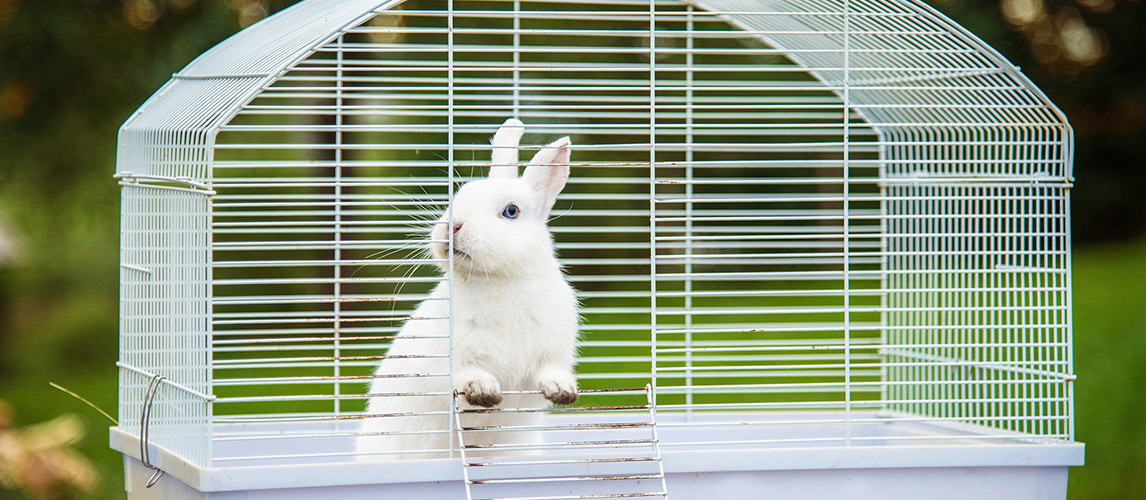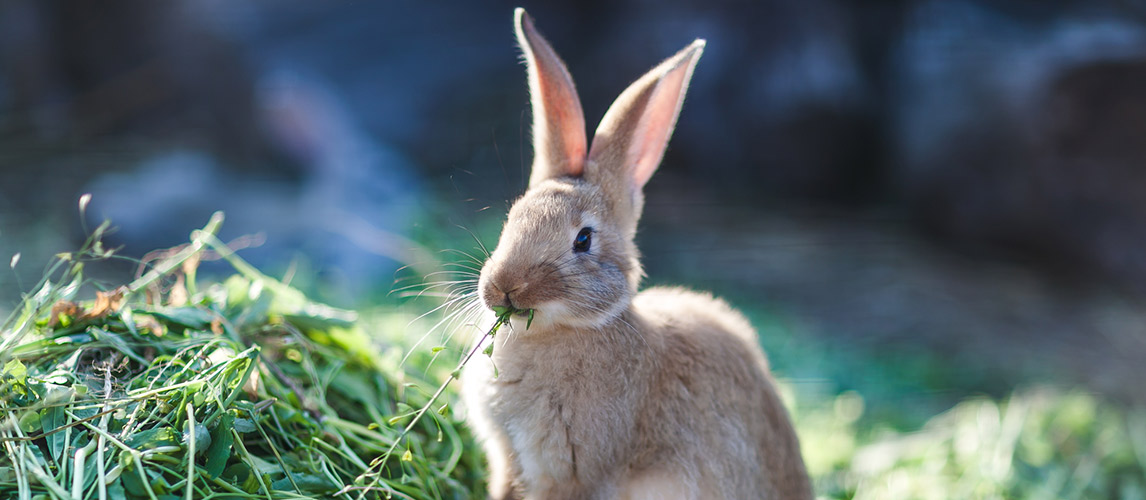Animals are sweet, lovable, and fascinating companions, but they can also be inconvenient, smelly or noisy. Not all pets will suit your living circumstances and you have to think about their compatibility with your lifestyle. For example, noisy pets, like parrots, will not make good pets if you live in a small apartment with thin walls. Even if you are fine with the noise, your neighbors might not be! Rabbits have a reputation for being nice, quiet pets to live with. But is this true, and if so, when do they make noise?
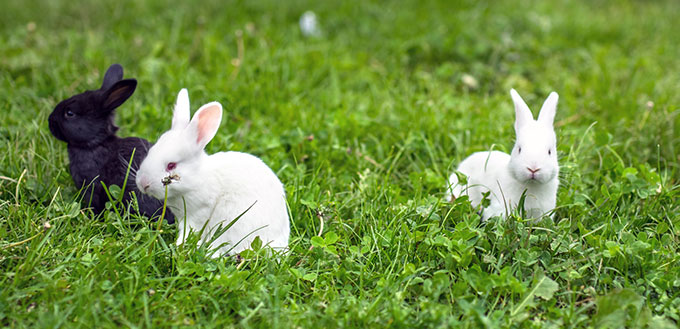
Are Rabbits Actually Quiet
The good news is that, compared to other animals, rabbits are quiet animals. They do not often make any vocalizations, and when they do, the noise will not usually be unexpectedly loud, like a squawk. When you think about it, this makes sense. After all, rabbits are well-known for being a prey species. While predators only need to be silent long enough to stalk and catch their food, prey never know when their vocalizations could give them away. Other interesting attributes that demonstrate that rabbits are a prey species include:
- Eyes that can see behind as well as in front of them
- Fur colors that could blend into their surroundings
- Short sleep cycles to limit the amount of time they are vulnerable to attack
- Twitchy ears that move around, alert to noise
In terms of keeping a quiet pet, however, noise isn’t just about vocalizations. Rabbits are definitely one of the quietest pets you can have, but you should also consider the sounds they can make running around. With the proper care and attention, it can be possible to keep a pet rabbit in a reasonably sized apartment, but consider your downstairs neighbors who may have to deal with the clicky, clacky sounds of a rabbit running around all day, and, even, all night. Luckily, keeping your rabbit’s nails short should help with this, but you should still consider how annoying the pitter-patter of tiny paws could be.
Rabbit Vocalizations And What They Could Mean
Another important aspect of rabbit noises is what they could possibly mean. Although the sounds may be relatively rare and quiet, rabbits do make noises, particularly if they are used to living in captivity and have never lived close to a potential predator. Here is a list of the noises, both good and bad, that you may hear, and what they might indicate about your rabbit’s thoughts.
- Purring
Let’s start with the good news – sometimes your bunny is making a noise because they are happy. One of the more obvious signs of happiness is purring. Yes, rabbits can purr like cats do! However, a rabbit purrs by gently rubbing their teeth together rather than by using their throat. If your rabbit makes this noise, you are doing something right and they are relaxed and happy.
- Humming
A second positive rabbit sound is humming. All rabbits can hum when they are in a good mood, but, primarily, humming come from male rabbits when they are trying to impress a female rabbit. It is a sweet, flirty noise that breeders are often particularly happy to hear.
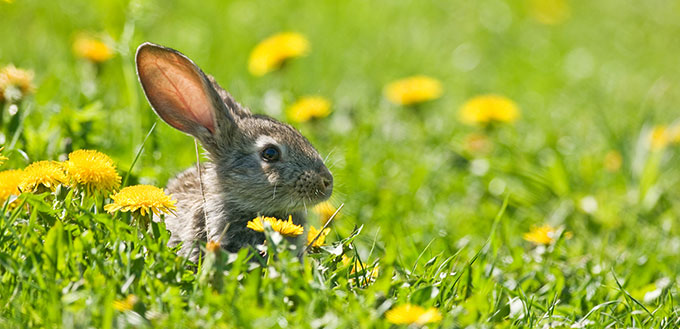
- Clucking
Last of all, your rabbit may cluck. This doesn’t really mean clucking like a chicken, but you will recognize it as a harsh, but very quiet, deep clicking sound. Most often, this sound should occur when they are eating, and indicates that they are really enjoying their rabbit food. This means you can use this sound to determine what their absolute favorite treats are.
- Squeaking
Perhaps the most common rabbit noise is squeaking, but it is also the hardest to correctly understand. Most of the time, squeaking is a positive sign as it demonstrates their happiness. However, some squeaking could result from frustration and mild fear. These negative squeaks are a little deeper, but you may need to take time to get to know your individual rabbit and what their different squeaks could mean.
- Screaming
As rabbits are used to living with the constant threat of danger, they have many more negative and warning noises than positive. The most obvious one is screaming. This is a horrible sound that, thankfully, most owners will never hear. It is a sign of true fear and stress, so act carefully but urgently, as they may be in genuine, immediate danger.
- Hissing
Another noise you may not associate with rabbits is hissing. Like snakes, hissing is a defensive noise that is specifically used when a rabbit feels under threat from another rabbit. The hiss is used to warn that rabbit ‘don’t mess with me’. If you hear this, your rabbits may be able to attack each other, or you.
- Whining
Another obviously sad and negative sign is whining or whimpering. Most often, this sound occurs in captivity when a rabbit is being handled and doesn’t want to be. If your bunny whimpers in your arms, put them gently down. You may also hear it in protest of a new cage-mate, particularly for a female rabbit that is pregnant.
- Growling
Although you may associate growling with much larger animals, rabbits can, and do, growl when they are angry and defensive. It may go hand-in-hand with snorting, and if you hear either it is very likely they are about to lunge at you to bite you, or someone else. If you are quick and careful enough, you should try to remove the perceived threat from their environment as quickly as possible for their own protection
- Teeth grinding
Although not strictly a vocalization, teeth grinding is another common rabbit noise that you may be familiar with. The process of rabbit purring and teeth grinding may be similar, but they sound very different and mean very different things. While purring is positive, teeth grinding is usually a sign of pain, so if you hear it, you should take your rabbit to the vet to get checked out.
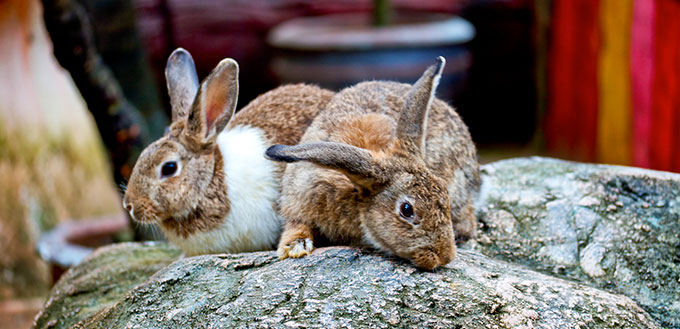
- Foot stomping
Another noise that is not strictly a vocalization, and may annoy the neighbors, is foot stomping. Rabbits thump their back feet when they are very nervous and frightened. It is their warning behavior that they use to alert other rabbits that a predator is nearby.
Sources:
- Joe Cortez, Rabbit Fun Facts, PetMD
- Pippa Elliott, MRCVS, How to Understand Your Rabbit, WikiHow



